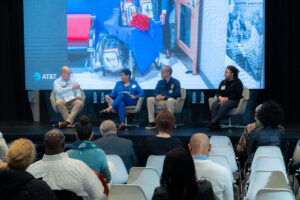Westside residents, community members, and business leaders attended the February 16 Transform Westside Summit to hear from Venessa Harrison, AT&T’s Coastal States President, and the pivotal role of corporate partnerships, particularly with AT&T, in driving neighborhood restoration efforts.
Dr. Kimberley Hundley, Behavioral Health Specialist, House of Cherith and Home on the Westside homeowner led the devotion. John Ahmann, Westside Future Fund President and CEO, moderated the discussion.
Key Moments from the Conversation
A video showcased AT&T’s initiative to distribute 500 laptops to Westside students, bridging the digital divide and providing vital resources for education and connectivity. The emotional impact on families and students was evident, with expressions of gratitude and excitement at the opportunity for enhanced learning and independence. A panel discussion featuring Venessa Harrison, Robert Williams, M. Agnes Jones Elementary School Principal, and Larrie King, a parent of a student who received a laptop, provided further insights.
Harrison has worked at AT&T for more than 40 years and currently leads the company’s strategy, policy, and corporate affairs activities, as well as guides governmental and community policy decisions in Georgia, North Carolina, and South Carolina. During the discussion, she emphasized the company’s commitment to closing the digital divide through continued collaboration and investment in infrastructure and educational initiatives.
“I grew up in low-income housing projects. And this community [the historic Westside] reminds me of my community. So I felt like I was giving back using AT&T’s resources to be able to make an impact in the community,” said Harrison. “I believe that affordable housing and internet access are two of the most critical things that you need. You can’t close the digital divide if you don’t have a home for our people to live in.”
Principal Williams highlighted the transformative impact of technology on student learning, emphasizing the importance of partnerships with industry experts to enhance educational experiences.
“It’s been overwhelmingly positive from our students, as well as our families when we look at the opportunity to be able to access a variety of different apps and create their own timeline at their own pace,” said Williams. “The students can extend their learning at home, and they’re really able to explore all their different interests and know that there are really limitless opportunities out there that are now available to our families.”
Larrie King shared her family’s experience with receiving a tablet, emphasizing its positive impact on her daughter’s self-esteem and academic independence.
“When she came home and let us know she won a laptop, you just saw the excitement in her eyes, and it built her self-esteem up,” said King. “It gave her that independence at home, where before she and her brother were working on two different assignments with access to only one device. She’s now able to access apps she uses at school at home so she can work independently on her own time.”
Collaboration emerged as a central theme, with panelists expressing appreciation for Dan Cathy’s advocacy and emphasizing the importance of ongoing community engagement and networking. The Summit concluded with a call for continued collaboration and gratitude for the transformative efforts underway in the Westside community.
Miss the event? Watch the full Transform Westside Summit on YouTube.

